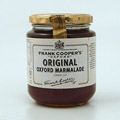"English" food that doesn't come from England
| | ||

|
baked beans I always thought that baked beans in tomato sauce were British to the core. They were even classified as "essential food" for rationing purposes during the second world war. But it's not so I'm afraid. Tinned baked beans were first imported into England by the London department store Fortnum and Mason in 1901 as a luxury food item. And who made those baked beans? The American company Heinz. Heinz first started producing baked beans in their new British factory in 1928 but had been making them in America and Canada since the 1880's. The beans used are known as "navy beans" which are a type of haricot bean and the tomato sauce is sweetened with sugar and seasoned with salt, vinegar, herbs and spices. The British eat baked beans at every time of day. Some (but not me) with their breakfast, some (including me) for lunch and some as a 'vegetable' with their evening meal or with fish and chips. Personally, I think you can't beat baked beans on toast splashed all over with Worcester Sauce as a warming winter lunch. |
|
| | ||

|
tomato ketchup You'd have to go back a few generations to find a British child who didn't think that tomato ketchup was the most normal thing in the world. It is an essential accompaniment to the Full English Breakfast. Indeed, ketchup or catchup or catsup has been made in Britain for centuries. In Hanna Glasse's book "The Art of Cookery", published in 1747, there is a recipe for English Catchup but it is made in the traditional way with mushrooms not tomatoes. The earliest recipes for tomato ketchup appear in the early 1800's not in England but in the USA. The recipes must have quickly spread to England as there is a recipe for Tomata Catsup in Eliza Acton's book "Modern Cookery for Private Families" which was published in 1845. Tomato ketchup was first made commercially in England in the 1920's when the American company Heinz opened a factory here. Their tomato ketchup must have caught on very quickly because the factory produced 10,000 tonnes of the stuff in its first year alone. |
|
| | ||

|
marmalade Marmalade is a fruit conserve made from bitter Seville oranges sweetened with sugar and is an indispensable part of an English breakfast. The conserve includes the peel of the orange which, if thick-cut, results in an Oxford marmalade. If the peel is thinly shredded instead then it becomes the Scottish version, Dundee marmalade. The English think marmalade is English and the Scots swear it was invented by Janet Keiler in Dundee in 1797. However, neither Scotland nor England can claim true heritage for marmalade because it is actually Portuguese in origin and was originally made from quinces (marmelos) not oranges. |
|

